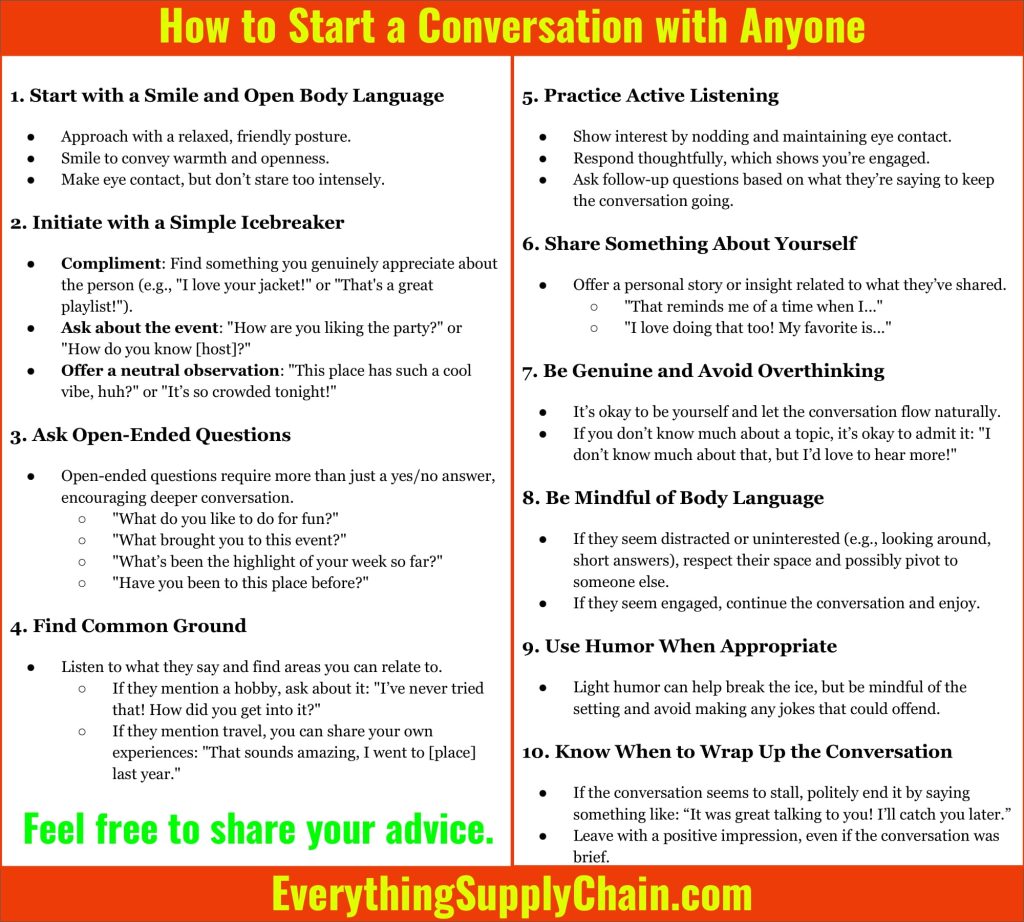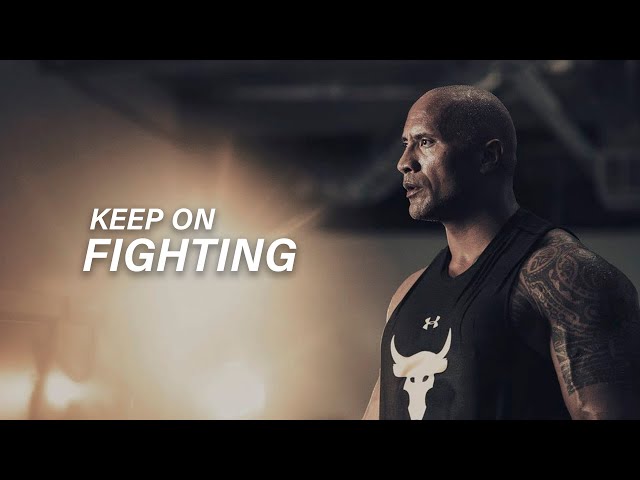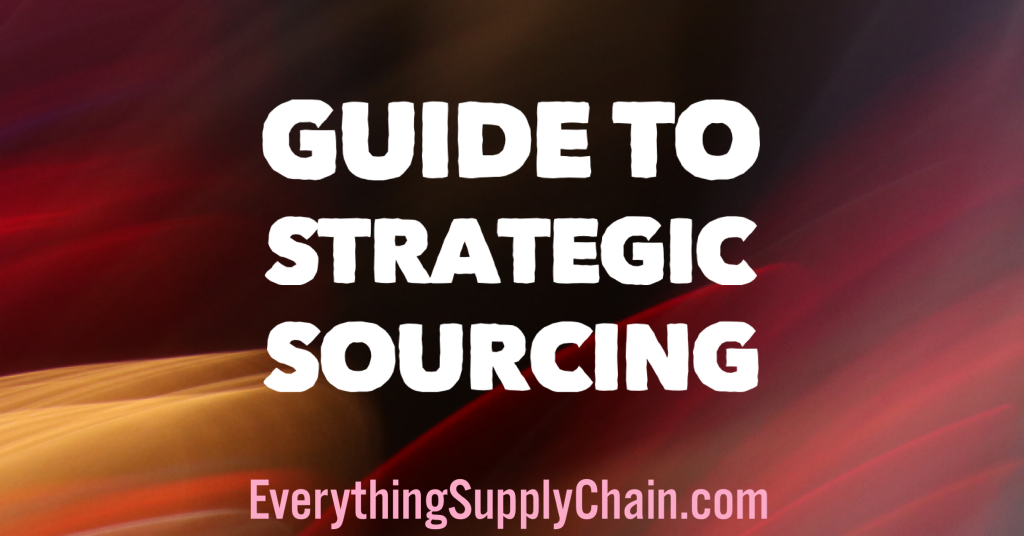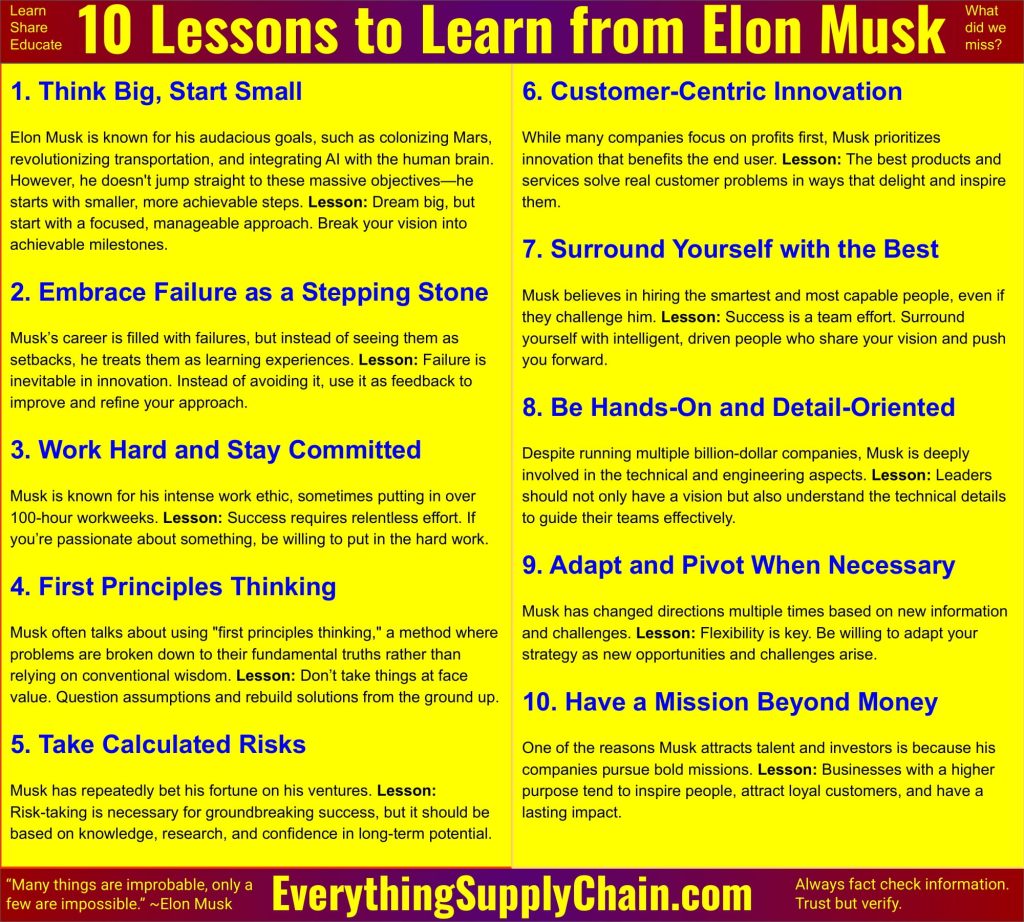How to Start a Conversation with Anyone.
Have you ever been in a room with a bunch of people and wondered how to start a conversation with anyone? If you want something quick and easy the “How to” one pager is a perfect place. If you need further information scroll down and you will find everything on the “How to” page as well as much more.

1. Start with a Smile and Open Body Language
- Why it matters: A smile and open body language make you appear approachable and friendly, which invites others to engage with you.
- Details:
- Relax your posture: Avoid crossing your arms, as it can seem closed off. Stand or sit up straight but avoid appearing stiff.
- Physical proximity: Don’t get too close too quickly, but stand at a comfortable distance. If the person seems to move away or isn’t responding positively, take a small step back.
- Eye contact: Gently make eye contact but don’t stare—this shows confidence and helps the other person feel seen and valued.
2. Initiate with a Simple Icebreaker
- Why it matters: Starting with a simple and non-intrusive comment can ease the tension and give the other person a chance to respond.
- Examples:
- Compliments: Compliments can break the ice, but make sure they’re sincere and specific. “I love your shoes! They’re so unique—where did you get them?”
- Event-based questions: Asking about the event is an easy way to start a conversation. “What do you think of the music tonight? It’s pretty different from what I expected.”
- Shared experiences: If you’re both at the same party or event, you have a shared experience right there! “I’ve never been to a party like this—how about you?”
3. Ask Open-Ended Questions
- Why it matters: Open-ended questions promote conversation by encouraging people to share more about themselves. It shows that you’re genuinely interested in getting to know them.
- How to ask:
- Instead of “Did you have a good day?” ask “What was the best part of your day today?”
- Instead of “Do you like music?” ask “What kind of music do you listen to when you’re relaxing?”
- If you’re at a specific event, like a holiday party or a work gathering, ask, “What’s the best part of this event for you?”
- Tactical tip: Try asking “How do you know [host/organizer]?” or “How did you get involved in [activity/event]?”. This helps you establish a connection by focusing on the shared context of the gathering.
4. Find Common Ground
- Why it matters: Finding mutual interests or experiences helps build a deeper connection and keeps the conversation flowing.
- How to do it:
- Leverage what they say: If they mention a hobby or interest, ask more about it: “You love hiking? That’s awesome! Have you been to any cool trails recently?”
- Share your own experiences: If you have a similar hobby, interest, or experience, share it briefly to build rapport: “I’ve also done a bit of hiking, especially in [location]! Do you enjoy the outdoors a lot?”
- Tactical tip: If they’re talking about a topic you don’t know much about, don’t be afraid to admit it! “I’ve never been to [place]—what’s it like?”
5. Practice Active Listening
- Why it matters: Active listening shows that you respect the other person’s point of view and makes them feel heard and understood.
- How to do it:
- Nod: A simple nod shows you’re following along.
- Paraphrase: If you don’t understand something, restate it back in your own words: “So, you’re saying that you got into [topic] because of [reason]?”
- Ask follow-up questions: Engage with their answers by asking questions that dive deeper. For example, if they mention their passion for a specific sport: “What got you interested in that sport? How long have you been playing it?”
- Tactical tip: The more curious you are about their life, the more they’ll be inclined to share. This leads to a more meaningful exchange and helps build a connection.
6. Share Something About Yourself
- Why it matters: People connect with other people by finding similarities and shared experiences. By being open about your own thoughts and experiences, you invite others to do the same.
- How to do it:
- Share a brief, relevant story that relates to what they’ve said. If they mention loving a particular type of food, you could say, “That reminds me of when I tried that dish in [location]. It was amazing!”
- Be authentic and not overly rehearsed—people connect more with sincerity than with a perfect story.
- Tactical tip: Keep it brief and balanced—avoid turning the conversation into a monologue. It’s important to also give the other person space to share.
7. Be Genuine and Avoid Overthinking
- Why it matters: Being authentic helps you relax and builds trust with the other person.
- How to do it:
- Don’t try to be someone you’re not, and don’t worry too much about what the other person might think. Most people are too focused on themselves to scrutinize every little thing you do.
- If you’re nervous, acknowledge it with humor: “I always feel a bit awkward at parties—do you ever get that way?”
- Avoid pretending to know more than you do about a subject. If they’re talking about something you don’t understand, admit it and ask them to explain—it’s a great way to bond.
- Tactical tip: Embrace silence if it happens—don’t feel pressured to fill every gap with words. Sometimes pausing gives both of you time to reflect and think of something interesting to share.
8. Be Mindful of Body Language
- Why it matters: Body language can convey much more than words, and it’s important to be aware of how the other person is reacting to your conversation.
- How to do it:
- Read their signals: If they’re facing away from you, looking around the room, or crossing their arms, they may not be interested or may need a break. If they lean in, maintain eye contact, or smile, they’re likely engaged.
- Respect personal space: Everyone has different comfort levels with physical proximity. Be aware if the other person seems uncomfortable or tries to move away.
- Tactical tip: If someone seems disinterested or distracted, it’s best to gracefully exit the conversation. You can say something like, “It was really nice talking with you! Enjoy the rest of your night.”
9. Use Humor When Appropriate
- Why it matters: Humor can break the ice and make people feel comfortable, but it needs to be used with care.
- How to do it:
- Light self-deprecating humor can make you seem down-to-earth and relatable: “I’m so bad at remembering names! I’ll probably call you ‘[incorrect name]’ for the rest of the night.”
- Keep your humor inclusive and non-offensive. Avoid controversial topics like politics, religion, or personal critiques, as these can quickly shut down a conversation.
- Tactical tip: Observe the tone of the group or the setting to determine if humor is appropriate. In a formal gathering, it’s better to stick to light-hearted jokes rather than anything too edgy.
10. Know When to Wrap Up the Conversation
- Why it matters: Ending the conversation at the right time ensures that both you and the other person leave with a positive impression.
- How to do it:
- Be mindful of when the conversation starts to wind down. If you notice the other person is distracted, looking around, or responding with short answers, it might be a sign to wrap it up.
- Gracefully exit by saying something like, “I’m going to grab another drink, but it was really nice talking with you. Hope we can chat again later!”
- Tactical tip: If you’re in a social setting, it’s okay to move around and interact with multiple people. People appreciate the short, but quality exchanges, rather than long-winded conversations.
Quotes about Making Conversation
- “It was impossible to get a conversation going, everybody was talking too much.” ~Yogi Berra
- “Your dream is out there waiting for you. You just have to go out and get it.” ~Dave Waters
- “Ultimately, the bond of all companionship, whether in marriage or friendship, is conversation.” ~Oscar Wilde
- “Taking part in stimulating and rewarding conversations will become a reality. All you have to do is look somebody in the eye, smile, and start a conversation!” ~Don Gabor
- “I’ve learned that people will forget what you said, people will forget what you did, but people will never forget how you made them feel.” ~Maya Angelou
- “Find something you really love doing and mix it with something you really care about.” ~Kathleen Hanna
- “Disclose your hopes, dreams, loves, joys, and sorrows so people will be able to identify with you. We all share these basic emotional experiences.” ~Don Gabor
Motivation and Improvement Resources
- Famous Failures – Michael Jordan, Albert Einstein, Oprah Winfrey…
- FORGET THE PAST – Motivational Video.
- Kaizen Way: ONE SMALL STEP CAN CHANGE YOUR LIFE.
- Process Improvement Quotes and Blogs.
- Speak Like a CEO – Cheat Sheet.
- The Mexican Fisherman Story. How Much Money Is Enough?
- Who moved my Cheese? Best selling book about dealing with change.
- 7 Habits of Highly Effective People.










